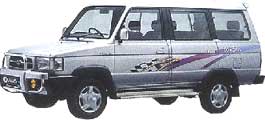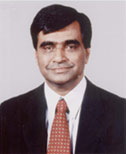Dark horse enters auto races
By Venkatachari Jagannathan | 04 Oct 2002
 Chennai: The giant is stirring. Toyota Kirloskar Motor (TKM) seems to be gearing up to challenge Maruti Udyog and Hyundai in the Indian automobile market.
Chennai: The giant is stirring. Toyota Kirloskar Motor (TKM) seems to be gearing up to challenge Maruti Udyog and Hyundai in the Indian automobile market.
Says TKM deputy managing director K K Swamy (See: ‘Steering the Toyota vehicle’) says: "In 10 years, we want to be among the first three auto companies in India in terms of market share." In numbers, and given the industry’s growth expectations, TKM will have to roll out 1 million units every year, up from the 30,000 units it sells currently."
TKM (www.toyotabharat.com) is a subsidiary of Toyota Motor Corporation (TMC), with the Kirloskars holding just 1 per cent in its equity. For the $106-billion turnover TMC, Indian operations are too small even to merit a passing mention in its annual report.
Last year, TKM registered a turnover of Rs 1,621 crore, selling under 30,000 units. Now compare this to TMC’s global sales last year of 5.5 million units. But this state of affairs may not continue for long. Recent media reports suggest that Toyota is planning to make India the major sourcing base for components as well as cars.
 TKM is also gearing up to make new and better offerings. The company has not only launched a new, upgraded version of the Qualis investing Rs 44 crore, but also announced the imminent entry of the Camry (in end-2002) and the Corolla (early-2003). The Prado Land Cruiser is also slated for launch. When would the Prado/Land Cruiser hit the Indian roads? "Possibly after the Corolla," answers Swamy.
TKM is also gearing up to make new and better offerings. The company has not only launched a new, upgraded version of the Qualis investing Rs 44 crore, but also announced the imminent entry of the Camry (in end-2002) and the Corolla (early-2003). The Prado Land Cruiser is also slated for launch. When would the Prado/Land Cruiser hit the Indian roads? "Possibly after the Corolla," answers Swamy.
Media reports also indicate the company’s long-term plan to roll out a small car — Vitz, Yaris or Mira — for Indian and global markets. The Japanese auto giant is planning to leverage India’s cost advantage and its own manufacturing efficiency to get a cutting edge in the global market. But that has to be in phases, and the Japanese are working it out.
The first step is to develop a competitive three-tiered supply chain with cost and quality assured. A Toyota group company, Toyota Industries Corporation, partnering with TKM and the Kirloskar group, is setting up a 100-per cent export-oriented unit to manufacture automobile transmissions under the name Toyota Kirloskar Auto Parts. The Rs 360-crore project is coming up in Bidadi, near TKM’s plant.
But Toyota officials are tight-lipped when it comes to discussing their future India plans. Says a cautious TMC group manager (India) Shinobu Teramoto: "To become a full-fledged passenger car company, we have to study the market and build the foundation. Two and a half years’ experience in this market is not enough."
The new offerings
TKM, like Hindustan Motors and Ford India, is following the twin track system — manufacture some models here and import some as completely built units (CBUs). TKM director (marketing) Satoshi Aoki says the Camry will be in the form of CBUs while the Corolla will be made at Bidadi, but with imported components. "The local content in the Corolla will be 60 per cent," adds Swamy.
The Corolla production capacity will at least be around 10,000 units and the vehicle will be pitted against the Skoda Octavia Lancer and the Sonata, while the Camry will slug it out against the Ford Mondeo and others in that class.
Though officials are silent on the price front, media reports say the Camry will be priced at Rs 17-19 lakh while the Corolla is pegged at Rs 10 lakh. "Everything hinges on the market response," says Aoki.
Five hundred additional hands have been recruited at the factory and are being trained to assemble and service the two new offerings and the upgraded Qualis. The company has put in another Rs 225 crore for expansion to assemble the Corolla at its Bidadi facility.
Qualis to drive ahead
The Qualis, which had become entrenched in the gap between Tata Engineering’s (Telco) Sumo and Safari, and Mahindra and Mahindra’s Armada and Bolero, found a new threat in the entry of the aggressively priced Scorpio from the M&M stable.
TKM replied with the upgraded Qualis. "The new Qualis comes with lowered centre of gravity, tubeless tyres and alloy wheels with the interiors and exteriors getting a makeover," says TMC chief engineer (product planning division) Toshi Ezaki.
The interiors are more luxurious, with armrests for the captain seats in the second row, power windows, and wood finish dashboard. The rear doors have child-protection locks. The new variant offers the choice of seating seven, eight or 10.
The Qualis comes in four models. Says general manager (marketing) Sandeep Singh: "For the low-end fleet operators and government institutions there is the 10-seater diesel non-air-conditioned, non-power steering and windows for Rs 5.20 lakh. A slightly better 10-seater diesel is the one with single air-conditioner and power steering for Rs 6.32 lakh."
The remaining two are high-end models — seven- and eight-seaters — sporting dual air-conditioners, power steering, power windows, and priced at Rs 8 lakh and Rs 8.5 lakh, respectively. The car gives a fuel efficiency of 12-13 km per litre of petrol / diesel — a good deal for a mid-sized luxury car buyer.
Targeted marketing
The 65,000-plus Qualis populating Indian roads have made Singh buoyant. "From the current level of 10 per cent of the auto market, the multi-utility vehicle (MUV) segment will grow to 15 per cent in two years," he predicts. "MUV sales this year should touch 72,000 units."
While the Qualis commands 42-per cent market share in the segment, Telco’s share will be around 30 per cent for the Sumo and the Safari put together, and M&M’s 18 per cent.
But it is the government sales — mainly to state police departments — that is giving TKM bulk volumes. The company gave one vehicle free to various state police departments for use. The bait worked well with the Mumbai, Karnataka and Chennai police who inducted a good number into their service.



















